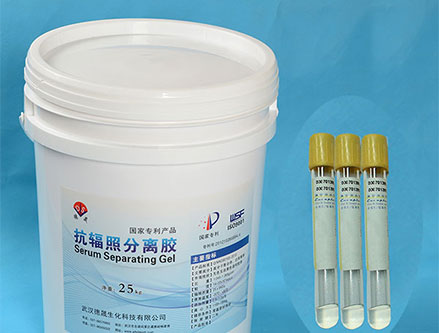BLOOD COLLECTION TUBE ADDITIVE

產品說明
Additives in blood collection tubes play an important role in blood collection/vacuum blood collection. According to different functions of blood collection tube additives, they could be separated into blood anticoagulation, blood coagulation and separation gel. These blood tube additives are widely used for various tubes including: serum tubes, sodium citrate hemosinking tubes, special tubes for blood glucose detection, micro peripheral blood collection tubes and nucleic acid detection tubes, DNA preservation tube, PRP tube, CPT tube, PST tube or in scientific research experiment.
As a manufacturer of additives in blood collection tubes, we provide high-quality serum separation gel, EDTA K2, EDTA K3, heparin sodium, heparin lithium, blood coagulant, sodium citrate, blood collection silicide agent and other products. These blood tube additives meet ISO9000 standards and obtain SGS certification and Chinese national patent certificate. First class quality and perfect after-sales service enable us to provide professional solutions for customers at home and abroad. We are committed to becoming a world-leading brand of blood tube additives.
Click and check the information of our blood culture tube additive products below. If you have any needs, welcome to contact directly!
Use Of Blood Collection Tube Additives In Vacutainers
The following table lists the most commonly used blood collection&culture tube additives, and their uses in blood collection tubes:
Additive for Blood Culture
Tubes with golden cap/containing serum separation gel and coagulant
The role of tube additives: Promote rapid blood coagulation, quickly obtain clear, large amount of serum samples.
The purpose of serum separation gel tube: Keep serum stable for 48 hours, detect multiple clinical biochemical and immune indicators, and get real results.
Additives in Blood Tubes
Purple head cap tube containing EDTA K2/EDTA K3/EDTANA2's
The role of tube additives: they can effectively chelate calcium ions in the blood to prevent blood clotting.
EDTA whole blood vessel Uses: protect cell morphology, more commonly used in blood routine examinations, blood rheology, immune-hematology experiments and blood bank experiments Projects such as
Tube Additives
Heparin sodium/lithium heparin-containing green head cap tube
additives: inhibit the formation of thrombin, prevent platelet aggregation and play an anti-coagulant effect. Heparin tube uses: to obtain high-quality plasma for emergency biochemistry and blood rheologyitem
Additive in Lavender Top Tube
With a coagulant orange cap action additive tube: protease activated fibers, blood rapid solidification coagulants tube uses: complete coagulation of blood in a short time for inspection medical biochemistry, immunology
Light Blue Tube Additive
Fluorine The role of sodium fluoride + EDTA K2/ sodium fluoride + potassium oxalate gray cap tube
additive: prevent blood glucose degradation, an excellent protective agent forglucose detection. Blood glucose tube use: used for blood sugar, glucose tolerance, moderate hemolysis, clinical trial confirmation
Royal Blue Top Tube Additive
Containing sodium citrate black cap tube
action additive: the use of citrate ions and calcium ions is sodium citrate combine to form calcium citrate, to prevent blood coagulation
blood sedimentation tube purpose: suitable for clinical detection of ESR
Additives In Blood Tubes FAQs
Q
What are the most common additives in blood collection tubes?
A
The most common additives used in blood culture collection are serum separating gel, heparin sodium, lithium heparin, EDTA K2, EDTA K3, blood coagulant, and siliconizing agent for test tube treatment.
Q
What is the significance of additives used in blood culture collection?
A
Additives in blood collection tubes play a role in rapid blood coagulation or anticoagulation during blood collection, protect blood integrity, and ensure the authenticity and accuracy of various biochemical test items.

